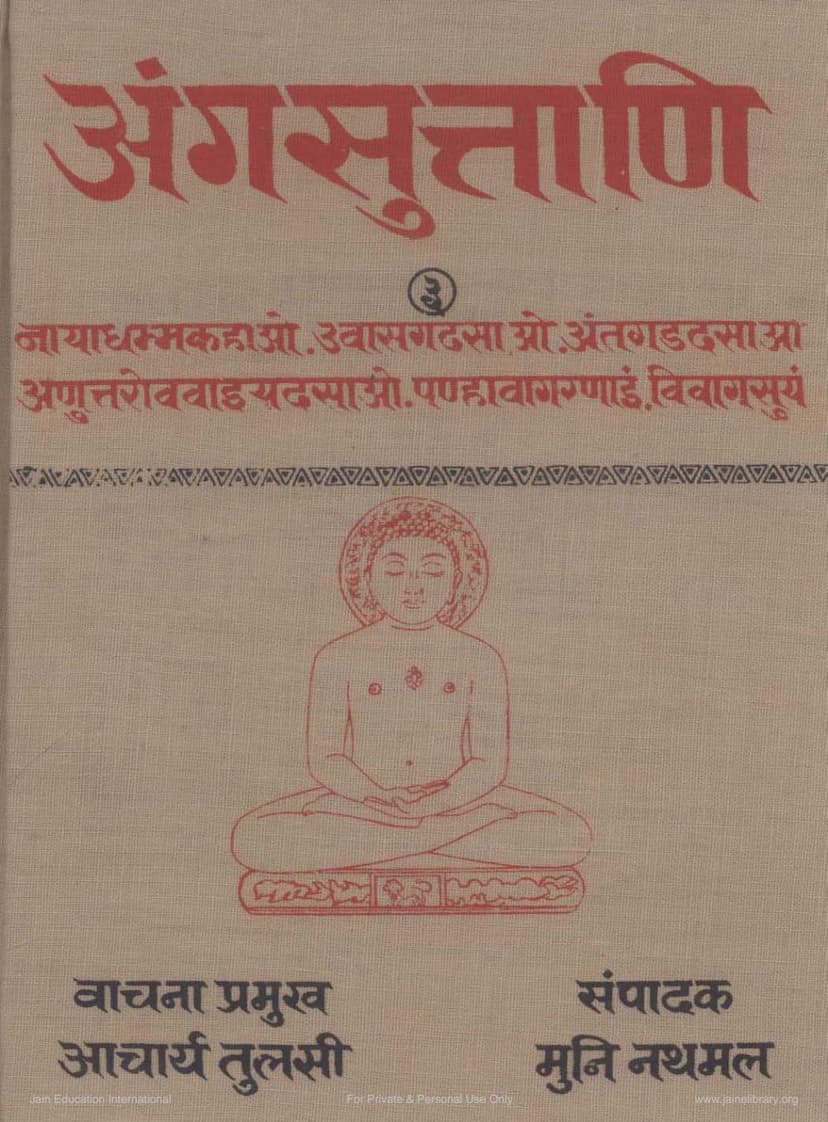Agam 08 Ang 08 Antkrutdashang Sutra Antgaddasao Terapanth
Added to library: September 1, 2025

Summary
This Jain text, Antakṛtadashā Sūtra (Book 8, Ang 8 of Agam Sutra), published by Jain Vishva Bharati, Lāḍnū, Rajasthan, is a critical edition of a significant part of the Jain canon. The volume is dedicated to Acharya Tulsi, with Muni Nathmal as the editor. It was released on the occasion of the 25th Nirvana anniversary of Lord Mahavira.
Key aspects of the text and its publication:
-
Content: The Antakṛtadashā Sūtra is the eighth Anga of the twelve Angas of the Jain canon. This particular volume focuses on the third section of the Anga Sūtras, encompassing the following six texts:
- Nāyādhammakahāo (ज्ञाताधर्मकथा) - The sixth Anga, dealing with examples and religious fables.
- Uvāsagadasāo (उपासकदशा) - The seventh Anga, describing the lives of ten principal lay devotees (Upāsakas).
- Antagadadasāo (अंतकृतदशा) - The eighth Anga, narrating the lives of individuals who achieved liberation from the cycle of birth and death.
- Anuttaraupapātikadaśāo (अनुत्तरोपपातिकदशा) - The ninth Anga, focusing on individuals reborn in the highest heavens (Anuttara heavens).
- Paṇhāwāgaraṇāi (प्रश्नव्याकरण) - The tenth Anga, dealing with various questions, sciences, and divine dialogues.
- Vivāgasuyam (विपाकसूत्र) - The eleventh Anga, describing the consequences (fruits) of good and bad deeds. The publication also notes that the first four Angas (Āchārānga, Sūtakṛtānga, Sthānānga, and Samavāyānga) were published in the first volume, and the fifth Anga (Vyākhyāprajñapti or Bhagwati) in the second.
-
Editorial Approach: The text is a critical edition, meaning it has been meticulously compiled and edited based on various manuscripts. The editors have followed established scholarly methods, considering the meaning, context, previous textual traditions, and commentaries to determine the most accurate original text. They acknowledge potential errors in writing and interpretation that may have occurred over time.
-
Key Figures:
- Acharya Tulsi: The spiritual guide and primary visionary for this extensive project of re-editing and publishing the Agam texts.
- Muni Nathmal: The editor who meticulously worked on the textual research, compilation, and translation.
- Shreechand Rampuria: The Managing Editor and Director of the Āgama and Literature Publication Department at Jain Vishva Bharati.
- Financial Assistance: Sri Ramlal Hansraj Golchha from Biratnagar, Nepal, provided significant financial support.
-
Publication Details:
- Publisher: Jain Vishva Bharati, Lāḍnū (Rajasthan).
- Date of Publication: Vikram Samvat 2031, Kārtik Krishna 13 (corresponding to the 2500th Nirvana Day of Lord Mahavira).
- Printer: S. Narayan & Sons, Delhi.
- Page Count: 925 pages.
- Price: Rs. 80/-.
-
Dedication: The book is dedicated to the monks Acharya Jaya, Kaluganī, and others who contributed significantly to the study and preservation of Jain Agamas.
-
Purpose: The publication is part of a larger endeavor by Jain Vishva Bharati to make the Jain Agamas accessible to the public in a scholarly and accurate form. It aims to present the sacred words of Lord Mahavira, particularly during the significant occasion of his 2500th Nirvana anniversary.
-
Specifics of the Antagadadasāo section:
- The Antagadadasāo itself is described as having eight Vargasa (sections) and ten Adhyayanas (chapters) within each Varga.
- The text provides detailed information about the manuscripts used for the critical edition, including their origin, estimated age, and physical descriptions.
- The content of the Antagadadasāo includes stories of individuals like Vasudeva Krishna, Gajasukumala, and Arjunamalakara, highlighting themes of karma, renunciation, and spiritual realization.
In essence, this publication represents a significant effort to critically edit and preserve the ancient Jain scriptures, making them available for scholarly study and devotional practice, thereby honoring the teachings of Lord Mahavira.